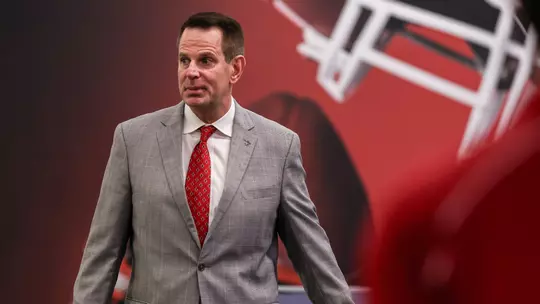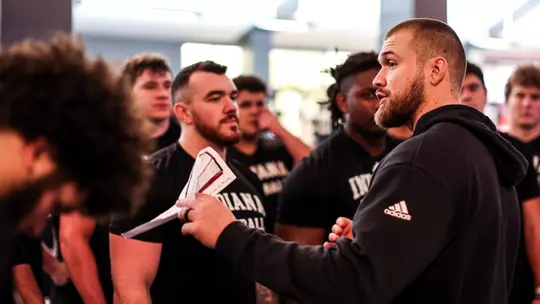
Win Now – Cignetti Won’t Wait on Football Success
Pete DiPrimio | IUHoosiers.com
BLOOMINGTON, Ind. - Forget obstacles. Curt Cignetti has no time for that. Indiana’s new head football coach has games to win, dominant performance to achieve, and a world to convince.
“We’ve got to change the way people think about Indiana,” he says. “We've been adamant that we're going to win, we're going to win this year and we're going to change the brand, the expectation level, and the way people see Indiana football.”
Patience doesn’t suit Cignetti. He’s at IU to win now, win often, win consistently, and for those who say it takes time, well, get a clue.
His recruiting pitch starts simple -- forget the past.
“Anything you know about Indiana football, any perception you have, you need to erase the tape because here's what it's going to look like,” he says.
Cignetti has won everywhere he’s been, including four years at Alabama as a receivers coach/recruiting coordinator under Nick Saban. He was 52-9 at James Madison, 11-1 last season. His overall head coaching record is 119-35 in 13 seasons, and if it hasn’t come at the Power Five level, guess what?
It will.
“There's no reason we can't be successful here,” he says. “We're going to be successful here. It's one day at a time. It's a process right now. It's always a process.”
Cignetti’s bold approach to coaching and winning has spiked interest and ticket sales. Hoosier fans want to embrace a football winner and are hopeful Cignetti can return the program to consistent winning ways.
“We've got to do it on the field,” he says. “When you're successful on the field, then you start to change the way the public, the state, the Big Ten, and the country think about Indiana Football. You start putting more people in the stands, selling out games, then it's hard to get tickets. That's what we're going to do.”

Cignetti has spent his career outworking the other guy, typically arriving at the office each day at 5 a.m., and it’s paid off with plenty of success and zero losing seasons.
Still, time off is crucial given the grind of what’s ahead and Cignetti understands that, sometimes with the help of his wife, Manette. Now that the latest recruiting period is over, Cignetti is giving his coaches a few days off, as well as himself.
“I’ll get away. I don’t want to, but my wife convinced me I need to. I’ll enjoy that. Then it will be all ball.”
Still, enjoyment has limits.
“I’d rather be watching tape.”
How do you build a program? It starts with team identity.
“This is who we are; this is how we practice; this is how we play; this is how we play every play -- fast, physical, relentless,” Cignetti says. “We finish one play at a time, six seconds a play. Every play has a life and a history of its own. You finish, and it’s not affected by success, not affected by failure, and then on to the next play.”
For Cignetti, it’s more than just winning the moment, the drill, the play.
“That's not really the purpose,” he says. “We're trying to get consistency and performance play at a high level, play in, play out.”
When it comes to practice, Cignetti favors efficiency over longevity. He plans to only use 13 of the 15 allowed spring practices. He says he’s never used all of the 25 fall camp practice days, has never used all of the allowed 20 hours per week.
“Sometimes less is more,” he says. “More isn’t always more. That’s the maximum amount they give you. That doesn’t mean you have to use them all.”
Cignetti practices are fast and organized and emphasize constant movement. You play as you practice so that you are so in tuned to what you’re doing that game situations and pressure plays don’t matter.
They do, of course, but it comes down to this -- thrive in the moment.
“In those close games,” Cignetti says, “you're doing your thing. It’s 11 guys doing their jobs. It's not addition, it's multiplication. You don't have a guy thinking I've got to make a play affected by the circumstances of the game.
“That's what we try to establish at the beginning. That normally takes time with a new team. They don't get it at first.”
It starts this spring.
"You want to develop players, get your offense, defense, special teams systems in, see improvement on a daily basis, keep guys healthy, don't get anybody injured," he says. "Looking forward to getting on the field."

Cignetti’s fast and physical style is honed by Derek Owings, the new director of football athletic performance who had the same role at James Madison. He creates and utilizes position-specific workouts.
“He's a big part of what we do,” Cignetti says. “That's why I do everything I can to keep him on the roster, pay him as well as I can, because he makes a difference.
“He's a winning edge. I think our guys are seeing that.”
Cignetti also brought in 10 former James Madison players who are well versed in Owings’ training system, and in Cignetti’s winning ways. They helped speed up the transition of all the players.
“We've got a lot of guys that are excelling in that program now,” Cignetti says. “You just can't have enough guys in your program that think right, that think like champions.
“Let's face it, the last three years here there hasn't been a lot of success. You bring in a bunch of people that have had a ton of success, and that's only going to help your team.”
Strength and conditioning training, especially football training, once boiled down to this -- lift as much as you can for as long as you can. Now, it’s more scientific, more speed and explosive oriented, more sport- and position-specific.
Owings is well versed in that. He has Cignetti’s total confidence.
“Strength and conditioning have really changed through the years,” Cignetti says, “and I think he's on the cutting edge. He gets great results.
“I don't mess with him. That's his area. I let him go.
“I know the players really like what we're doing. He changes their bodies. He'll cut a lot of body fat, still add lean muscle mass, make them quicker, stronger, faster, more explosive. I've seen the results.”
Since his late November hiring, much of Cignetti’s time has involved hiring a staff, transforming the current roster through the transfer portal, locking in this high school recruiting class, retaining some of last year’s players, and targeting the Class of 2025.
“I walked in kind of a crisis roster situation,” Cignetti says. “We had 10 offensive starters in the portal, a number of defensive guys, 25 guys total. We were rebuilding and making the roster.
“I thought we got a lot of good work done in December and changed the roster, which I'm very optimistic about, what we got done in the transfer portal.”
College transfers include Ohio quarterback Kurtis Rourke, a sixth-year passer who threw for nearly 5,500 yards and 36 touchdowns over the past two seasons.
Now Cignetti and his staff can focus on spring practice and beyond.
“We haven't been around the kids a lot,” he says. “Derek has been around the kids all the time. The brief moments I've been back in the office, I try to get down to the weight room, see the guys, see how they're doing. We'll get an opportunity to spend more time with them now.”
